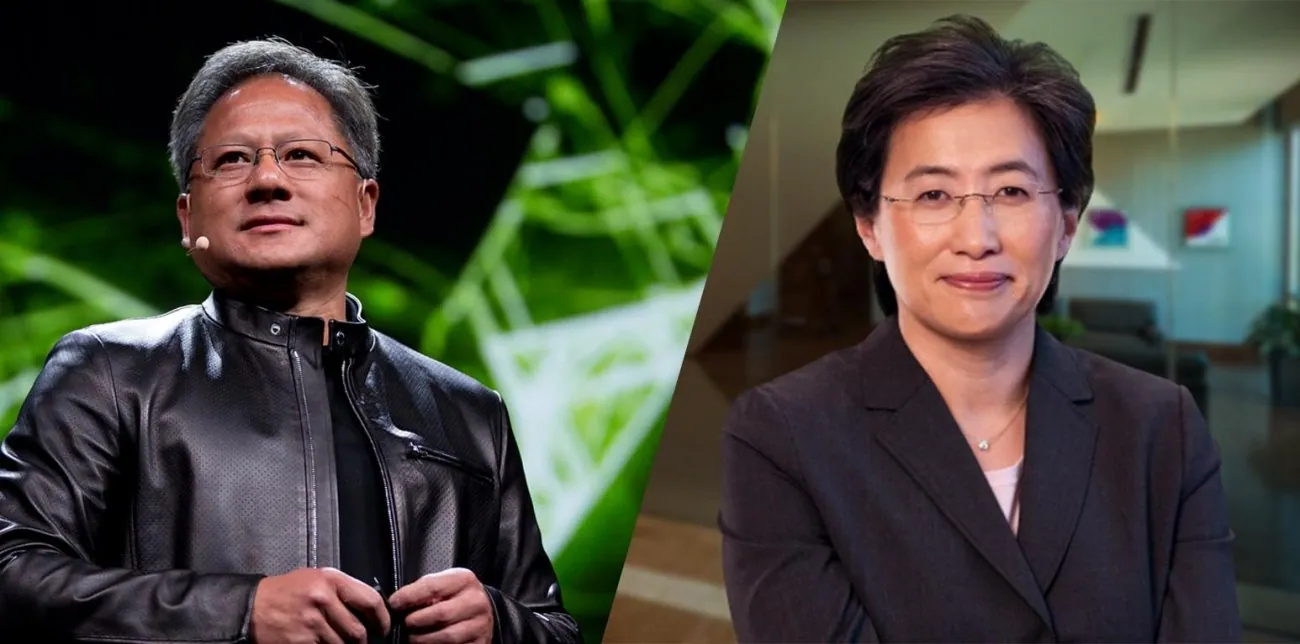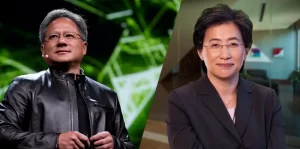Introduction:
In recent years, the proliferation of Artificial Intelligence (AI) applications has revolutionized various industries, driving unprecedented demand for high-performance computing (HPC) solutions. In this competitive landscape, industry giants such as NVIDIA and AMD are strategically positioning themselves to dominate the AI market, leveraging cutting-edge technologies and partnerships with key players like Taiwan Semiconductor Manufacturing Company (TSMC).
Follow us on LinkedIn for everything around Semiconductors & AI
TSMC’s Strategic Role: Fuelling the AI Boom
Taiwan Semiconductor Manufacturing Company (TSMC) plays a pivotal role in the semiconductor industry, supplying advanced processes and packaging technologies to power the AI revolution.
Recent reports suggest a surge in demand for TSMC’s offerings, as companies race to secure capacities for their AI-related endeavors.
NVIDIA’s Pursuit of AI Excellence
NVIDIA, a prominent figure in the AI chip market, is strategically partnering with TSMC.
Leveraging TSMC’s cutting-edge processes and packaging technologies is integral to NVIDIA’s product enhancement strategy.
NVIDIA’s flagship H100 chip, fabricated on TSMC’s 4-nanometer process, showcases the company’s dedication to advancing AI computing.
The utilization of advanced Chip-on-Wafer-on-Substrate (CoWoS) packaging further underscores NVIDIA’s pursuit of innovation.
This collaboration underscores NVIDIA’s position as a leader in AI chip technology, poised to deliver groundbreaking solutions for diverse applications.
Read More:$42 Million: PSMC Opens New Factory to Produce 50,000 12-Inch Wafer including CoWoS – techovedas
AMD’s Strategic Moves in AI Acceleration
AMD is leveraging TSMC’s advanced technologies to develop its MI300 series AI accelerators.
The focus on System-on-Integrated-Chip (SoIC) packaging sets AMD apart in the AI space.
AMD’s innovative approach integrates CPU and GPU dies vertically, optimizing performance and efficiency.
The MI300 series aims to deliver enhanced capabilities for handling AI workloads effectively. By pioneering SoIC packaging, AMD demonstrates its commitment to pushing the boundaries of AI hardware development.
TSMC’s Capacity Expansion: Meeting Surging Demand
To meet the burgeoning demand for AI-related products, TSMC is aggressively expanding its advanced packaging capacities.
By significantly ramping up its monthly production capacity for CoWoS and SoIC packaging, TSMC aims to ensure uninterrupted supply to its customers and maintain high utilization rates for related production capacities.
Read More:Satya Nadella, Sam Altman, and Sundar Pichai to Join U.S. AI Security Advisory Board – techovedas
The Global AI Landscape: Cloud Service Providers Drive Demand
The intense competition in the AI chip market is fueled by global cloud service providers (CSPs) such as Amazon AWS, Microsoft, Google, and Meta. These tech giants are actively investing in AI server infrastructure, driving up demand for products from industry leaders like NVIDIA and AMD.
Read More: Breakthrough: Intel Marches Towards Scalable Silicon-Based Quantum Processors – techovedas
Why is this a Big Deal?
Nvidia and AMD securing all of TSMC’s advanced packaging capacity for HPC is a big deal:
HPC Market:
- Performance Leap: Advanced packaging like CoWoS and SoIC allows for cramming more processing power into a single chip. This translates to potentially significant performance gains for next-generation HPC systems used in AI, scientific research, and other demanding applications.
- HPC Market Growth Signal: The high demand for this advanced packaging reflects an optimistic outlook for the HPC market itself. Companies are clearly anticipating a surge in the need for high-powered computing.
Nvidia and AMD:
- Competitive Edge: By securing this capacity, Nvidia and AMD ensure they have access to the most cutting-edge packaging technology for their upcoming HPC chips. This could give them a significant edge over competitors who might have to settle for less advanced options.
- First Movers Advantage: Locking down this capacity early allows them to potentially be the first to market with next-generation HPC solutions, which can be crucial in this fast-paced industry.
TSMC:
- Market Dominance: This deal reinforces TSMC’s position as the world’s leading chip manufacturer, especially in the advanced packaging segment. It shows they have the most sought-after technology and production capabilities.
- Revenue Boost: Securing long-term contracts with major players like Nvidia and AMD guarantees them a steady stream of revenue for the next two years.
Overall Impact:
- Innovation Acceleration: This situation could accelerate innovation in the HPC space as companies race to develop the most powerful chips using these advanced packaging techniques.
- Potential Price Impact: With limited capacity available, the cost of these advanced packaging solutions might remain high, potentially impacting the final price of HPC systems.
This is a big deal because it signifies a significant shift in the HPC landscape, with advanced packaging playing a crucial role in future performance gains. It also highlights the fierce competition between chipmakers and the importance of securing cutting-edge technology for market leadership.
Conclusion:
The strategic maneuvers of major players like NVIDIA, AMD, and TSMC underscore the high stakes in the AI-driven technology landscape. With advanced processes and packaging technologies at their disposal, these companies are poised to reshape industries and drive the next wave of AI innovation, ushering in a new era of computing excellence.




